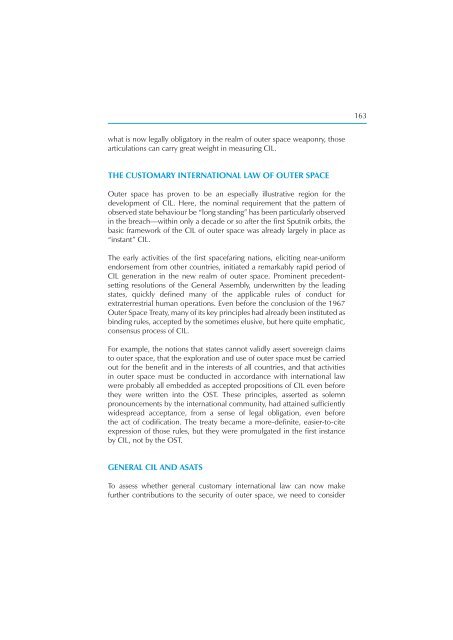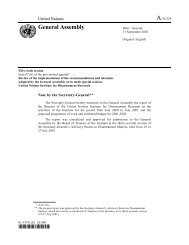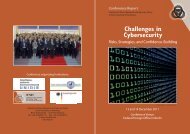Security in Space The Next Generation - UNIDIR
Security in Space The Next Generation - UNIDIR
Security in Space The Next Generation - UNIDIR
You also want an ePaper? Increase the reach of your titles
YUMPU automatically turns print PDFs into web optimized ePapers that Google loves.
what is now legally obligatory <strong>in</strong> the realm of outer space weaponry, those<br />
articulations can carry great weight <strong>in</strong> measur<strong>in</strong>g CIL.<br />
THE CUSTOMARY INTERNATIONAL LAW OF OUTER SPACE<br />
Outer space has proven to be an especially illustrative region for the<br />
development of CIL. Here, the nom<strong>in</strong>al requirement that the pattern of<br />
observed state behaviour be “long stand<strong>in</strong>g” has been particularly observed<br />
<strong>in</strong> the breach—with<strong>in</strong> only a decade or so after the fi rst Sputnik orbits, the<br />
basic framework of the CIL of outer space was already largely <strong>in</strong> place as<br />
“<strong>in</strong>stant” CIL.<br />
<strong>The</strong> early activities of the fi rst spacefar<strong>in</strong>g nations, elicit<strong>in</strong>g near-uniform<br />
endorsement from other countries, <strong>in</strong>itiated a remarkably rapid period of<br />
CIL generation <strong>in</strong> the new realm of outer space. Prom<strong>in</strong>ent precedentsett<strong>in</strong>g<br />
resolutions of the General Assembly, underwritten by the lead<strong>in</strong>g<br />
states, quickly defi ned many of the applicable rules of conduct for<br />
extraterrestrial human operations. Even before the conclusion of the 1967<br />
Outer <strong>Space</strong> Treaty, many of its key pr<strong>in</strong>ciples had already been <strong>in</strong>stituted as<br />
b<strong>in</strong>d<strong>in</strong>g rules, accepted by the sometimes elusive, but here quite emphatic,<br />
consensus process of CIL.<br />
For example, the notions that states cannot validly assert sovereign claims<br />
to outer space, that the exploration and use of outer space must be carried<br />
out for the benefi t and <strong>in</strong> the <strong>in</strong>terests of all countries, and that activities<br />
<strong>in</strong> outer space must be conducted <strong>in</strong> accordance with <strong>in</strong>ternational law<br />
were probably all embedded as accepted propositions of CIL even before<br />
they were written <strong>in</strong>to the OST. <strong>The</strong>se pr<strong>in</strong>ciples, asserted as solemn<br />
pronouncements by the <strong>in</strong>ternational community, had atta<strong>in</strong>ed suffi ciently<br />
widespread acceptance, from a sense of legal obligation, even before<br />
the act of codifi cation. <strong>The</strong> treaty became a more-defi nite, easier-to-cite<br />
expression of those rules, but they were promulgated <strong>in</strong> the fi rst <strong>in</strong>stance<br />
by CIL, not by the OST.<br />
GENERAL CIL AND ASATS<br />
To assess whether general customary <strong>in</strong>ternational law can now make<br />
further contributions to the security of outer space, we need to consider<br />
163








